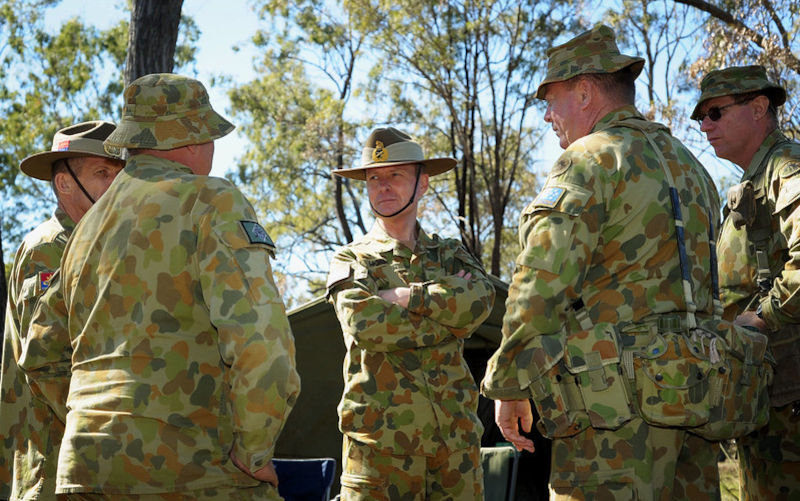'The standard you walk past'
April 19, 2022
The Australian Army has failed its own leadership test. Where does the buck stop?
In 2013 the then-chief of army, General David Morrison, shot to national fame when he circulated a video demanding an end to bullying, harassment and misogyny in his service.
‘The standard you walk past is the standard you accept’, Morrison told his troops. ‘If that doesn’t suit you’, he continued, ‘then get out’.
The favourable public response to Morrison’s dramatic challenge was a major factor in his selection in January 2016 as Australian of the Year.
In one of those odd quirks of history, the panel that chose Morrison was chaired by Ben Roberts-Smith, a former Special Air Service corporal, Afghanistan veteran and Victoria Cross recipient. Roberts-Smith currently is suing three newspapers and three journalists for defamation, claiming that articles published in 2018 contained false allegations of unlawful killings, bullying and domestic violence.
It seems that in taking his principled stance, General Morrison was calling-out decades of corrosion in his service’s leadership.
In November 2016, following years of rumours that Special Forces had been violating the laws of armed conflict in Afghanistan, the Inspector-General of the Australian Defence Force commissioned New South Wales Supreme Court judge Paul Brereton (who was also a major-general in the Army Reserve) to report on war crimes allegedly committed by the ADF between 2005 and 2016.
When Justice Brereton’s report was delivered in November 2020, Defence Minister Linda Reynolds stated that it made her feel ‘physically ill’.
Brereton found evidence of thirty-nine murders of civilians and prisoners ‘by or at the instruction of’ Australian Special Forces. Twenty-five ADF personnel were involved in those unlawful killings, most of which occurred between 2012 and 2013 and had been covered-up.
An organisational culture that allows individuals to believe they can commit the kinds of crimes alleged by Justice Brereton doesn’t happen overnight. It’s years in the making.
On 4/11 April 2022, the ABC Television show ‘Four Corners’ aired a story about the Australian-led peace-keeping operation in Timor Leste twenty-three years ago. According to Four Corners, ‘secret documents revealed eyewitness accounts of New Zealand special forces soldiers who accused an Australian SAS soldier of brutalising the corpses of two [Indonesian] militiamen in the aftermath of a fierce firefight’. Australian Federal Police who examined the case believed the Indonesians may have been shot at close range in an act of revenge.
Four Corners also revealed the existence of a ‘secret interrogation centre’ where Indonesian detainees, including civilians and children, claimed they were ‘stripped, assaulted, [and] deprived of food, water and sleep’ by SAS operatives. Australian military investigators recommended charges of torture but none was ever made.
Military police told Four Corners that what happened in Timor was ‘the start of a culture of impunity in the Australian SAS that led to alleged war crimes in Afghanistan’.
One of Justice Brereton’s more contentious findings was to attribute ‘moral command responsibility’ for what happened in Afghanistan primarily to ‘commanders at troop, squadron and task group level’. In the main, those men were corporals and sergeants. Corporals and sergeants are the war-fighting backbone of an army, but they’re also among the most junior ranks.
Not a general, or brigadier, or colonel, or even a major, to be seen.
The Australian Army has some 5500 officers. Almost without exception, they are dedicated, professional, honourable men and women who joined-up out of a sense of duty.
Yet it’s been left to a single junior officer, former SAS captain, Afghanistan veteran, now assistant Defence Minister, Andrew Hastie, to publicly condemn his service’s broken culture.
Called as a witness before the Roberts-Smith trial, Hastie framed his evidence within a ‘Heart of Darkness’ metaphor. Parts of the SAS, he stated, were ‘shorn of the just-war theory … you [could] make up your own morality … killing had become a sacrament in itself’. Hastie ‘felt ashamed’ of what had happened.
An expert on the psychology of military behaviour has suggested that other, more senior officers failed to act because they were too high-up the chain of command to see anything, or their priority was simply to keep the mission ‘ticking over’. Those who ‘did try to do something’ were either marginalised or dismissed.
On the field of combat itself, there may have been a blurring of ‘mateship’ with ‘leadership’; senior officers lacked the ‘street cred’ of junior but decorated patrol commanders; there may have been an insidious shift from ‘unacceptable behaviour’ to war crimes; and those crimes may have been confused with being a ‘good soldier’.
It might seem easy for outsiders who haven’t experienced the fearful circumstances of face-to-face combat to criticise the actions of those who have. But that’s why we have laws of armed conflict, a formal system of command, and endorsed Army ‘core values’; and it’s why the Australian Army values leadership above all other qualities.
It was former US president Harry S. Truman who popularised the leadership truism, ‘The Buck Stops Here’ – that is, at the top. It’s the most fundamental tenet of taking responsibility.
It’s not reasonable to expect senior commanders to control every single event that happens on the ground. But it is reasonable to expect them to shape their force’s culture and to enforce its code of conduct.
If our generals didn’t know what was happening, they should have; and if they did know what was happening, they should have done something about it.
That was General Morrison’s point. The standard you walk past is the standard you accept.


